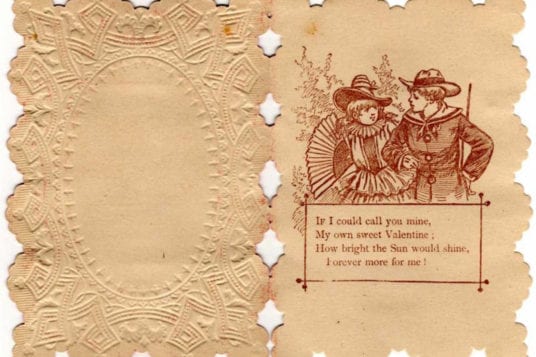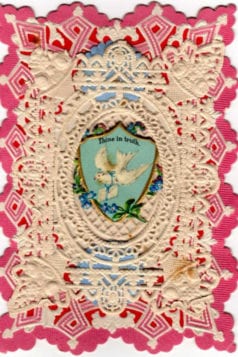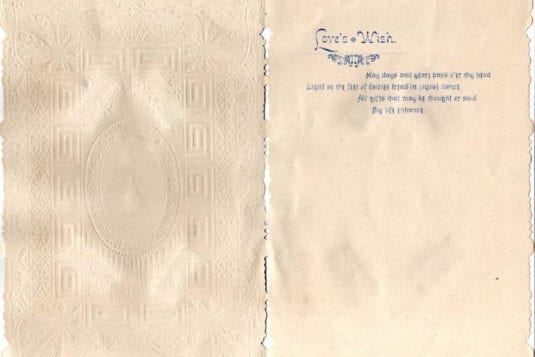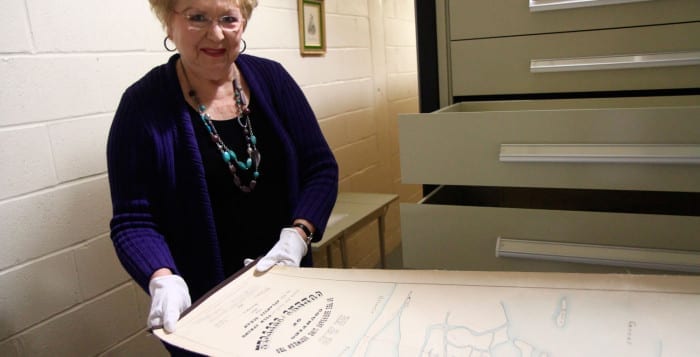Three Village Historical Society Archivist Karen Martin dug up some Valentine’s Day cards from the organization’s collection. To learn more about the history and manufacturer of Valentines in the U.S., the historical society suggests checking out https://www.worcesterhistory.org/blog/whitney/. The Three Village Historical Society is located at 93 North Country Road in Setauket. Happy Valentine’s Day!
Archives
Throwback Thursday: Huntington’s fickle valentine, 1819
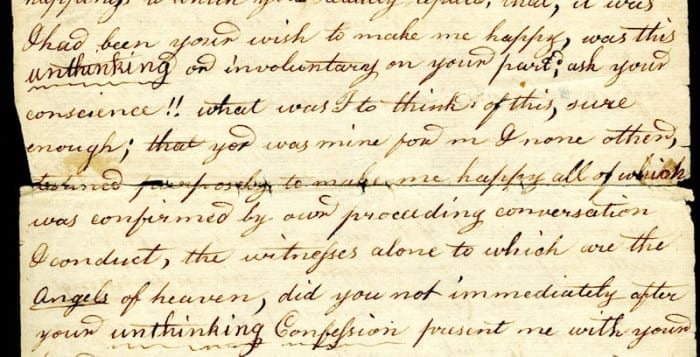
Huntington was once the setting of a stone-cold rejection.
Abraham Van Wycke, now long buried in his family plot in the cemetery behind the Huntington Town historian’s office, once had his then-beating heart broken when he received a brutal note reminiscent of a Dear John letter in 1819 from a woman named Mary.
Van Wycke, age 21 at the time, was taken with Mary, last name unknown, describing her “electric kisses” and “nectarious lips.” But she wrote him out of her future in one short, blunt letter and he, in response, drafted a letter he never sent back.
Huntington Town Archivist Antonia S. Mattheou discovered the letters — which are now in Huntington Town Hall’s historical archives — years ago, but she was unable to discover any more information about the elusive Mary or her relatives who disapproved of Van Wycke.
“I have for a long time suspected that my mother, from the coldness of her manner toward you, would not be pleased with you as her son-in-law,” Mary wrote. “This suspicion is now confirmed. Your visits at our house have been frequent this winter; they have been remarked by mother and uncle … that they would not sanction any such attachment. This is a good reason and the best I have to offer to justify the resolution which I have seriously and solemnly taken never to look upon you as my future husband.”
Van Wycke found this hard to believe, and said she once told him she would no longer care about what her mother and friends thought, that she would let them “think what they pleased of it.” He used her own words against her, after she described her previous declaration of love for him as an “unthinking confession.”
“Did you not immediately, after your unthinking confession, present me with your hand and an electric kiss from your nectarious lips, as a pledge of your engagement and constancy? Yes, and what did you say? That you [were] satisfied and happy and would have made the confession before, but fearing the displeasure of your mother had acted the reverse of your inclinations, but had decidedly come to the conclusion to make the confession? … Does this prove that the confession was unthinking or inconsiderate?”
Mary listed other reasons she thought Van Wycke was not suitable for marriage, including his health and financial stature.
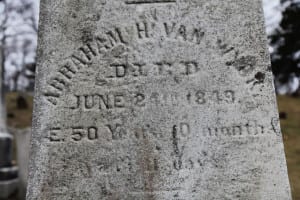
“You are not in a situation to marry and support me in the style of ease and comfort in which I am at present living under the roof,” she said. “You are not in good health, your constitution has been impaired by that most dreadful of all maladies, the consumption, from which I fear you are not entirely recovered.”
Mary pleaded to “be forgotten” or only seen as a friend and accused him of assuming too much of their relationship. She said her utterances of attachment did not equal “a promise to be your wife.”
Van Wycke found flaws in that reasoning, asking when he would have reasonably inferred that she was not interested.
“Sure it was not when you were caressing me with repeated anticipations of future felicity! Which inspired me with enthusiasm,” he said. “Nor was it at those times when you were placing electric kisses on my lips and face which are … never to be wiped away by a female! Was this unthinking? Was it not voluntarily granted? The unthinking confession, how was it?”
Van Wycke talked of conversations in which Mary had supposedly given full acknowledgement of desiring a life with him.
“We were talking of domestic happiness, to which I remarked that I never expected to know domestic happiness, to which you readily replied that it was and had been your wish to make me happy. Was this unthinking or involuntary on your part? Ask your conscience!”
Mary begged Van Wycke not to respond to her letter, as she felt there was no point: “Let me desire you also never to renew the subject of this letter you have before you now, the candid and full expression of my sentiments and feelings which makes it wholly unnecessary to discuss in private conversation,” she said.
Mary signed the letter “With due respect, your well-wisher,” and thus ended the last contact she ever had with Van Wycke.
Although Van Wycke ultimately did not send his response, he had originally intended to ignore her request for silence.
“Willingly would I comply with your requests in not answering your epistle, but my feelings prompt me to this act, and moreover … to present (together with your conscience) a memorial of your conduct to me,” he wrote.
Van Wycke died an unmarried man at age 51, on June 24, 1849. He foreshadowed his fate in his letter when he said, “This disappointment leads me to form a new system for my future life.”
34-year Huntington Town Clerk has put focus on preserving local history
There has been a steady hand at the helm of Huntington Town Hall for the past 30 plus years.
Jo-Ann Raia, Huntington Town clerk, was elected for the first time in 1981, and ever since then, she has not stopped bringing positive improvements to the town.
Raia has been a Huntington resident since 1958, but spent summers on the Island as child. She has worked under five supervisors and has served as secretary to the town board and board of trustees, among many other duties.
She has devoted much of her time in office to creating a state of the art facility for Huntington’s archives, and a successful records management program.
Raia said when town government moved into what is now Town Hall, in 1979, the archives were being stored in the old gymnasium, as the building used to be a high school.
“I was told that these were my records, as I am the legal custodian for Huntington,” she said in a phone interview. “I went to as many seminars as I could [on record keeping], I lobbied the state for funding and received state grants.”
She said the road was not easy to get a proper archive system in place, as she had to convince many people to give her the funds and resources required.
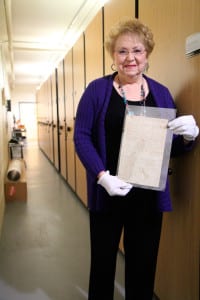
“When the town spends money on a baseball field, everyone can see it, but to put money into an area that’s restricted and no one will see it is a different story,” she said. “That’s why I had to convince and beg.”
The archives officially opened in October 1991 and ever since then, researchers and students from throughout Long Island have visited.
Through learning so much for the Huntington archives, Raia herself became well-versed in the topic, and has since spoke at conferences and panels on records management.
“We were the pioneers, and now [Huntington archives] runs like clockwork,” she said.
Some of the items in the archives that stand out to Raia are the Revolutionary War claims, the manumission of slaves and the Duke’s Laws.
Raia said she refers to the Revolutionary War claims as an I.O.U. book, with records of all of the things British soldiers borrowed from colonials living in Huntington in the mid 1770s, like oxen and wagons.
The manumission of slaves is a record of all the slaves freed from a former town supervisor who lived on Park Avenue in Huntington, and according to Raia, used to have African Americans enter through his back door as slaves, and leave through his front door as free citizens.
The Duke’s Laws, published in 1665, covered all the laws of colonial life, like no traveling on Sunday. Raia said Huntington is one of the few local governments to still have an original copy of them.
Aside from her many other duties as town clerk, Raia particularly enjoys the marriage marathon she performs every Valentine’s Day, where she marries multiple couples in a row throughout a day’s time.
In 1989, Raia was appointed marriage officer, and starting in 1995, decided to create a special event as marriage officer.
“I wanted to make it something special, so I researched other ceremonies, and found a special poem that I now recite that has sort of become my trademark,” she said.
The event has blossomed over the years, with merchants from all over town donating baked goods, flowers and gifts for the event. Raia personally donates all the paper goods and decorations.
Raia has presided over large and small ceremonies, and has even seen a ceremonial pick and axe procession performed by a local fire department.
“I never know what I’m going to see,” she said.



